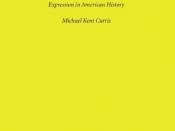In the essay in his recent book, "There's No Such Thing as Free Speech and it's a
Good Thing Too," Fish argues that free speech "is not an independent value, but a
political prize," and any differences, which the courts have drawn between, protected and
unprotected expressions are "malleable." Like any other concept, the principle of free
speech is, for Fish, "inherently nothing," but one more noise in the "din and confusion of
partisan struggle."
Fish, a literary theorist, has brought textual theory and post structuralism into the
debate over how to understand legal theory. Fish argues that there is no such thing as an
objective legal text that can be applied to law. So, for example, to use a title for his
famous essay There's No Such Thing as Free Speech and It's a Good Thing Too because
free speech does not and cannot reside in some Platonic ideal.
Rather it can only be
understood as a reason of politics or in terms of what people and groups can get away
with in any particular time and in a given circumstance. Fish analyzed textual studies and
legal studies particularly. This led to his view of "interpretive studies" as the location
where meaning is created in relation to a text. Such communities are usually composed of
"experts" or groups of like-minded and influential people, such as literary critics or
lawyers.
Fish also condemns the idea that legal theory can be used in a positive way to
guide legal judgments and justice in general. Instead he argues, "theory is irrelevant;"
judges, like baseball players or fully socialized members of any other interpretive
community, do not apply theory when they are making decisions. They might use theory
after the fact to provide a justification for their actions, but at the time...


